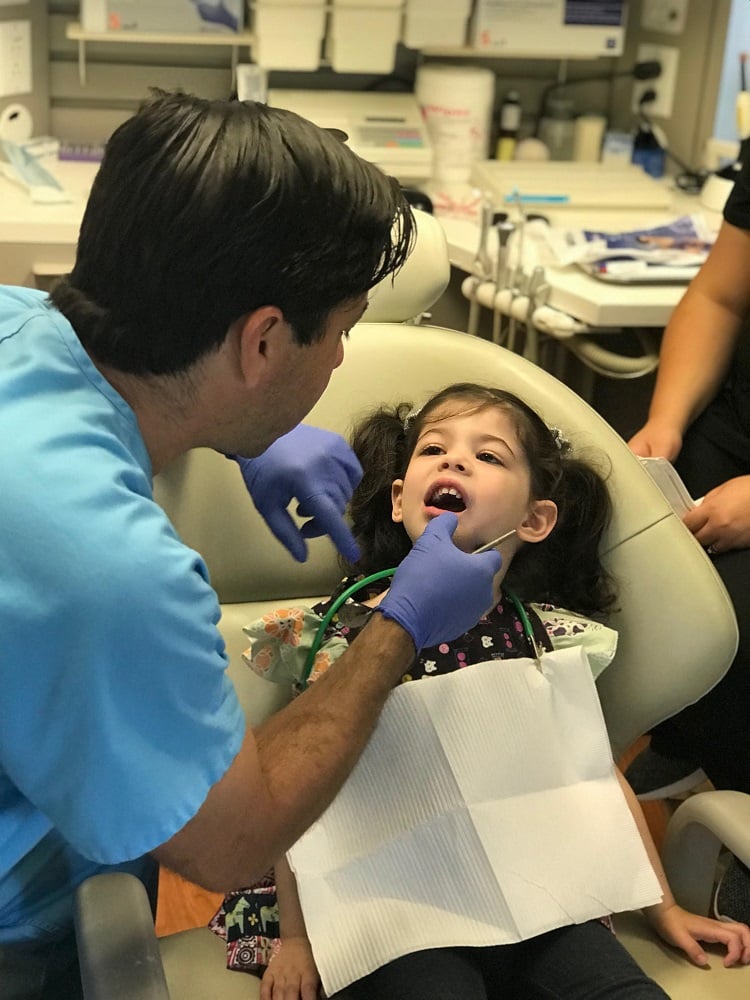February is Children's Dental Health Month, and Dr. Mike Richler, pediatric dentist at Nashoba Family Dentists, wants to be sure you have up-to-date information on taking care of your older children's dental health. (See our article on dental care for younger children too!)
Here is Dr. Mike's advice on issues common to older kids age 6 and up:
What should I do if my child’s permanent tooth is knocked out?
Rinse the knocked-out tooth in cool water. Do not scrub the tooth. If possible, replace the tooth in the socket and hold it there with clean gauze. If you can’t put the tooth back into the socket, place the tooth in a container of milk, or water if milk is not available. Come to our office immediately, or call us if it is after hours. The tooth has a better chance of being saved if you act immediately.
What should I do if my child’s tooth is fractured or chipped?
Contact our office as soon as possible. Time is of the essence! Our goal is to save the tooth and prevent infection. Rinse the mouth out with water and apply a cold compress to reduce swelling. It’s possible that if you can find the broken tooth fragment, it can be bonded back to the tooth. Follow the instructions above if you do find the tooth fragment.
What do I do if my child has a toothache?
Call our office immediately to schedule an appointment. To help comfort your child, rinse out the mouth with cold water and apply a compress.
How can we prevent dental injuries?
Simple. Sport related dental injuries can be reduced or prevented by wearing mouth guards. Child proofing your home can help reduce injuries at home. In addition, regular dental check ups will contribute to preventative care

What is a mouth guard?
A mouth guard is comprised of soft plastic. They come in standard or custom fit to adapt comfortably to the upper teeth.
Why is a mouth guard important?
A mouth guard protects the teeth from possible sport injuries. It does not only protect the teeth, but the lips, cheeks, tongue, and jaw bone as well. It can contribute to the protection of a child from head and neck injuries such as concussions. Most injuries occur to the mouth and head area when a child is not wearing a mouth guard.
When should my child wear a mouth guard?
It should be worn during any sport-based activity where there is risk of head, face, or neck injury. Such sports include hockey, soccer, karate, basketball, baseball, skating, skateboarding, as well as many other sports. Most oral injuries occur when children play basketball, baseball, and soccer.
How do I choose a mouth guard for my child?
Choose a mouth guard that your child feels is comfortable. If a mouth guard feels bulky or interferes with speech to any great degree, it is probably not appropriate for your child.
There are many options in mouth guards. Most guards are found in athletic stores. These vary in comfort, protection as well as cost. The least expensive tend to be the least effective in preventing oral injuries. Customized mouth guards can be provided through our practice. They may be a bit more expensive, but they are much more comfortable and shock absorbent.
What are dental sealants?
Tooth sealant refers to a plastic that a dentist bonds into the grooves of the chewing surface of a tooth as a means of helping prevent the formation of tooth decay.
How do sealants work?
In many cases, it is nearly impossible for children to clean the tiny grooves on their teeth. When a sealant is applied, the surface of the tooth is somewhat flatter and smoother. There are no longer any places on the chewing part of the tooth that the bristles of a toothbrush can’t reach and clean. Since plaque can be removed more easily and effectively, there is much less chance that decay will start.
What is the life expectancy of tooth sealants?
The longevity of sealants varies. Sealants that have remained in place for three to five years would be considered successful, however, sealants can last much longer. It is not uncommon to see sealants placed during childhood still intact on the teeth of adults. Our office will check your child’s sealants during routine dental visits and will recommend repair or reapplication when necessary.
Which teeth should be sealed?
Any tooth that shows characteristics of developing decay should be sealed. The most common teeth for a dentist to seal are a child’s back teeth, and of these teeth, the molars are the most common teeth on which dental sealants are placed. The recommendation for sealants should be considered on a case-by-case basis.
What is the procedure for placing sealants?
Generally the procedure takes just one visit. Placing dental sealants can be a very easy process. The tooth is cleaned, conditioned, and dried. The sealant is then flowed onto the grooves of the tooth where it is hardened with a special blue light and then buffed. All normal activities can occur directly after the appointment.
How important is brushing and flossing after sealants are applied?
It is just as important for your child to brush and floss their teeth. Sealants are only one part of the defensive plan against tooth decay.
How much do sealants cost?
This treatment is quite affordable, especially when you consider the value of protection against tooth decay. Most dental insurance companies cover sealants. Check with your insurance company about your child’s coverage.
Dr. Mike, Dr. Curley, and Nashoba Family Dentists' team of providers really look forward to meeting your family!
Nashoba Family Dentists offers total dental health care for your family. Our modern office has been in Littleton for over 30 years. For those thirty years, our top priority has always been the comfort and well being of our patients. Dr. Brendan Curley lives in the community he practices in and spends time outside the office coaching town soccer and football teams for his own children.
Give our office a call today at 978-486-8261 ~ we hope to see you soon!
Nashoba Family Dentists
256 Great Road
Littleton MA 01460
(978) 486-8261
Website: https://www.nashobafamilydentists.com/
Email: NashobaFamilyDentists@hotmail.com
Facebook: https://www.facebook.com/Nashoba-Family-Dentists-152669861438058/



